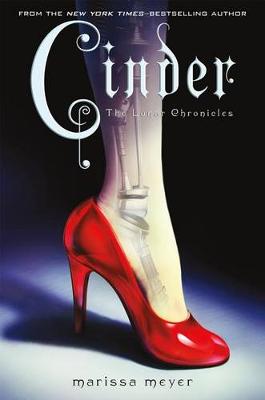Reviewed by Angie on
The characters also had a lot more depth than the fairytale. Cinder is not only mistreated by her stepmother, but she's also looked down upon by those in society who know she is a cyborg. Cinder tries to blend in as much as possible and earns her keep as a mechanic. Her stepsister, Pearl, is cruel towards Cinder, but her younger sister, Peony isn't. Even though that strays from the original, I loved that Cinder had at least one person who cared for her. Cinder loves her little sister very much, and I felt so awful when her one ally is taken away by med-droids after contracting the plague. At that point Cinder's life as she knows it changes forever.
Cinder now has to deal with her stepmother's backlash, since she blames Cinder for her youngest daughter's illness as well as her husband's death. It's no secret that Adri is disgusted by Cinder and wants her gone. Cinder also gets sold off to become a lab rat in order to find a cure for the plague, but her test results reveal a lot of unknown things about her heritage. There's a bit of a mystery surrounding that, but it was very predictable. However, that didn't keep me from enjoying it.
In addition to the new technology and the swiftly spreading disease, Cinder also covers some of the politics of the time. The moon is now inhabited by Lunars and a peace treaty is needed between them and Earth. However, the Lunar queen, Levada, is a horrible woman! She wants what she wants, and she wants it now! She'll stop at nothing to gain power and take control of Earth, but Prince Kai does his best to not allow it. Kai has a huge burden to carry, but he still manages to be incredibly charming. Unfortunately, Cinder makes sure to keep him at a steel arm's length.
Cinder is a highly imaginative retelling of Cinderella! It keeps just enough of the original premise in tact to make it recognizable, but it also has plenty of unique features to set it apart. It's also full of characters that you'll both love and hate, and maybe love to hate! This book is full of twists and turns for our heroine, but she handles them to the best of her ability. The ending has left me wanting more! Damn that cliffhanger!
Read more of my reviews at Pinkindle Reads & Reviews.
Reading updates
- Started reading
- 3 February, 2012: Finished reading
- 3 February, 2012: Reviewed
- 18 December, 2020: Started reading
- 18 December, 2020: on page 0 out of 400
- 18 December, 2020: Finished reading
- 3 February, 2012: Reviewed
